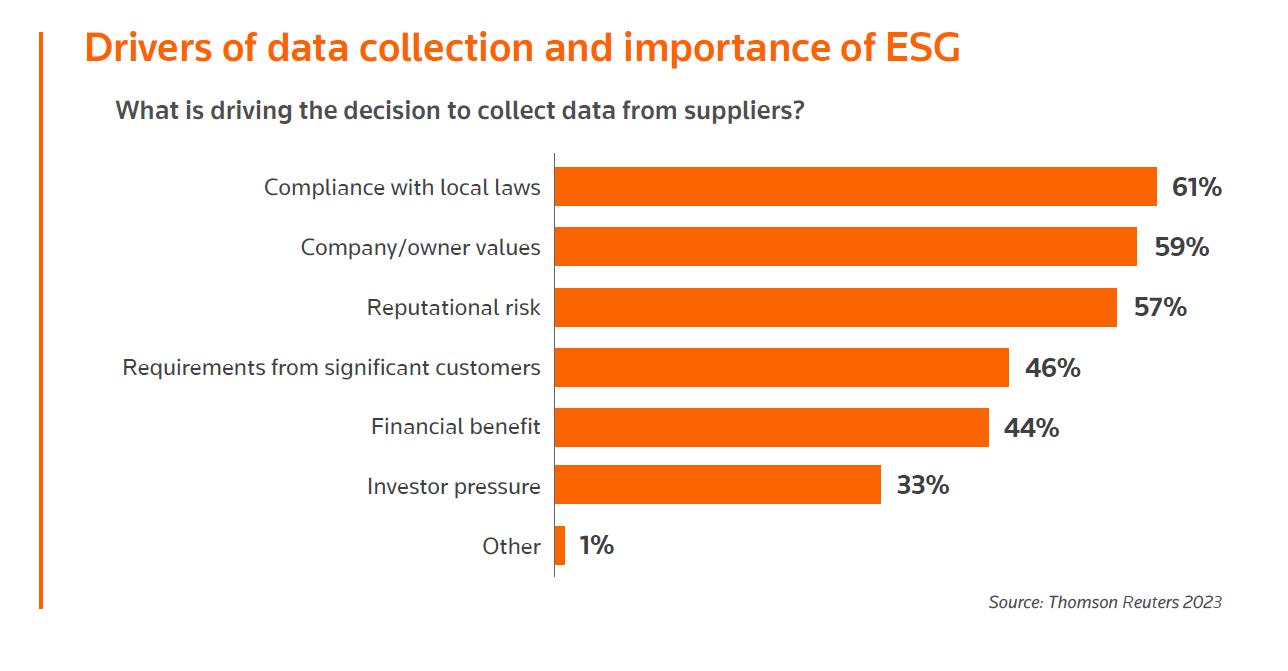The role of global trade professionals within a company has grown in importance around ESG issues, especially in data collection and supply chain management
Global trade professionals play a pivotal role in the execution of environmental, social & governance (ESG) strategies because of the presence of cross-border supply chains. In fact, 88% of businesses collect information for ESG purposes from their suppliers at least once a year, according to the Thomson Reuter Institute’s 2023 Corporate Global Trade Survey Report released in mid-September.

Global trade professionals involved in ESG
The decision to collect ESG data by global trade functions is driven by three main factors, according to insights from our survey: i) to comply with local laws around emerging environmental, labor, and human rights standards; ii) to support the company’s or owner’s values and ethics; and iii) to mitigate reputational risk. In fact, survey respondents from more than two-thirds of businesses said they take ESG considerations into account in their decision to use a supplier.
Because so many ESG criteria are connected to supply chains — such as carbon emissions, labor rights, anti-corruption, sustainable sourcing, and more — trade professionals are deeply involved in corporate ESG initiatives.

In addition, there are other related factors spurring global trade professionals’ involvement in ESG, including:
Expansion of data-gathering requirements — Companies are increasingly being challenged to measure metrics related to how the company manages its impact on biodiversity, the use of water and other natural resources, its treatment of workers, its progress on diversity, and dozens of other factors. Gathering data on suppliers is the trade department’s main responsibility.
Increase in jurisdiction-specific disclosure requirements — Driven primarily by the European Union, the United Kingdom, the United States, and Canada, reporting and disclosure requirements around ESG have ballooned in the past few years as climate-related risks have escalated and the notion of using forced labor at any point in the supply chain has not only become illegal, but also repugnant and risky. Specific jurisdiction rules from the last 18 months include:
-
-
-
-
- In the U.K. — In April 2022, companies with more than 500 employees are required to report on ESG issues.
- In the E.U. — In January 2023, the E.U.’s Corporate Sustainability Reporting Directive (CSRD) went into effect.
- In Germany — That country passed the Supply Chain Due Diligence Act, which focuses on environmental and human rights violations.
- In the U.S. — There have been longstanding rules targeting human rights violations and human trafficking, and many other countries are jumping on the ESG bandwagon for various reasons, including the fact that ESG compliance can be profitable.
-
-
-
Risk management — Companies that fail to comply with ESG reporting mandates risk alienating investors and customers, damaging the company’s reputation, and limiting the markets in which the company can operate.
Further, these measures apply to suppliers all along the supply chain, so responsible supply-chain management and scrutiny are now critical for companies dedicated to greater ESG transparency and overall compliance with emerging ESG regulations — in addition to tracking performance on carbon emissions and pollution.
ESG data collection correlates with size of organization
ESG considerations are especially important for businesses with more than $100 million in annual revenue. In fact, those business are more likely than smaller businesses to collect information on business ethics, waste management, anti-corruption, employee diversity, and percentage of materials recycled or re-used. More than half (57%) of the respondents to our survey said their companies collect data-privacy information from their suppliers.
Issues that are a priority for both small and large companies include those relating to data privacy, health and safety, labor standards, and carbon emissions. Indeed, more than half of companies are collecting data around health and safety (54%) and labor practices (51%), and just slightly under half of corporations collect information on suppliers’ business ethics (48%) and carbon emissions (47%).
Latin America stands out
Of those responding to our survey, 57% of respondents from businesses in Latin America said achieving a financial benefit was a driving factor in their ESG strategy, which is almost 20 percentage points higher than other regions covered in the survey. Latin American companies were also more likely to cite compliance with local laws as a driving factor, whereas in North America the most often cited reason for ESG data collection was alignment with the company’s values and ethics.
Of course, global trade managers are not solely responsible for collecting ESG data on a company’s suppliers, but they do have a more direct relationship with suppliers and access to data that ESG compliance teams need. So, depending upon the size of the company, the burden of gathering supply-chain data can fall on relatively few people in the trade department.
How big a burden this will become remains to be seen, but the writing on the wall is clear: ESG standards are now solidly embedded in the DNA of corporate governance and will only grow as more countries move from simply making recommendations on responsible corporate governance to passing legislation enforcing it.







